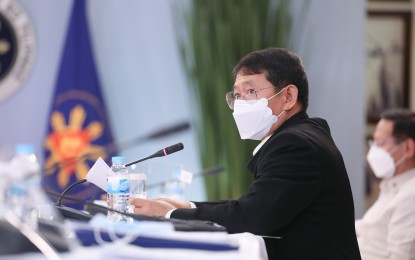
National Security Adviser Eduardo Año (PNA file photo)
MANILA – The Catholic Church plays an important role in ending violence and terrorism in the country, National Security Adviser Eduardo M. Año said over the weekend.
This was after the Catholic Bishops' Conference of the Philippines-Episcopal Commission on Public Affairs (CBCP-ECPA) became the first private-sector representative to the National Task Force to End Local Communist Armed Conflict (NTF-ELCAC).
“We are opening the doors of NTF-ELCAC to the Church because it has an important role to play in ending violence and terrorism in the country. For more than 50 years, we have lived under the scourge of the communist armed conflict. With peace now in sight, the Church has an important role to play in ensuring peace and development in the long term,” said Año, who is also the National Security Council director general, in a statement.
He added that they are looking forward to working with the CBCP in pursuing peace and development in all parts of the country, especially in conflict-affected areas.
Año said they are also eyeing a productive engagement with the CBCP and are open to suggestions from the Church in adopting “moral and ethical approaches in addressing communist insurgency” as earlier mentioned by CBCP president and Caloocan Bishop Pablo Virgilio David.
He said that with the CBCP's representation in NTF-ELCAC, they can immediately address concerns raised by the Church or by cause-oriented groups supported by them.
"Because of this development, the Church will have more opportunity to relay its concerns, since its mandate is to act as a liaison of the CBCP to (the) government,” he added.
CBCP-ECPA executive secretary Fr. Jerome Secillano attended the NTF-ELCAC’s executive committee meeting last Aug. 31 presided by President Ferdinand R. Marcos Jr. in Malacañang.
Año said the NTF-ELCAC’s main mandate is to formulate a whole-of-government approach to end armed conflict in the country and that the CBCP-ECPA’s membership in the task force ensures a whole-of-nation participation because the religious sector is an important component of the nation.
Año added that he sees the CBCP making a significant contribution to the development of areas previously under NPA influence as well as facilitating societal inclusivity in pursuit of peace.
With 19 guerilla fronts weakened out of 20 remaining guerilla fronts in the country, Año sees the end of the New People’s Army under the current administration.
“Given that we are now on the road to total victory, it’s necessary that we recalibrate the way we do things and the entry of the CBCP to NTF-ELCAC is one of the changes we implemented under the Marcos Jr. Administration,” he said.
Helping the people
Secillano, meanwhile, appealed to the public to be more “prudent” in issuing statements against the group’s decision to join the NTF-ELCAC Executive Committee with the sole intention "to help the people."
“We meant well sa aming (in going about with this) engagement na ito. We’re allowing ourselves to be a member of the NTF-ELCAC in good faith… Sa pagiging member namin dito sa NTF-ELCAC, we’re provided with a platform for the betterment of the people in the country,” he added.
Secillano is also the alternate representative for Bishop Reynaldo Evangelista, who is also from ECPA.
He also clarified that only the ECPA and “not the whole CBCP” would be the point of convergence for the task force because the commission's mandate is to deal with issues and concerns on public and private matters that affect the Church.
“We don’t want to be myopic in joining the NTF-ELCAC… Sana magkaroon tayo ng bukas na kaisipan at malawak na pang-unawa (I hope that we will all have an open mind and better understanding) Nakita naman namin ‘yung shift tulad ng development (we all saw the shift towards development,” he said, referring to the “paradigm shift” the government has been aggressively implementing in insurgent-cleared barangays in far-flung areas through the flagship project, Barangay Development Program.
On the issue of the so-called “red-tagging” and alleged human rights violations by government units, Secillano pointed out that the ECPA’s membership in the NTF-ELCAC will serve as an opportunity for closer dialogue.
“Everytime may (there is) red-tagging that also includes some of our priests and even bishops, we always reach out naman sa kanila at napapansin naman (to them and we always get the attention we need,” Secillano admitted, adding he sees the venue as the proper forum to prod the government to always give paramount for the promotion and protection of human rights.
“We also would want in the ExeCom (to give importance) to human rights. Mahalaga po itong component na ito dahil kabahagi po sa adbokasya ng ating Simbahan (this is important component because this is part of the advocacy of the Church)," he emphasized.
Meanwhile, NTF-ELCAC executive director Undersecretary Ernesto Torres Jr. said the CBCP-ECPA’s membership in the Execom is a “blessing” that provides an enormous boost in finding peaceful solutions to put an end to the decades-old violence espoused by the Communist Party of the Philippines-New People’s Army-National Democratic Front (CPP-NPA-NDF).
“We’re blessed to have the CBCP,” Torres said, adding that critics should “listen to the voice of reason rather than throw stones” at the task force and the CBCP.
Last week, the government announced the inclusion of the CBCP into the NTF-ELCAC Executive Committee, a development that drew a slew of negative reactions from different groups, including the front organizations of the CPP-NPA-NDF, like the so-called “Makabayan Bloc” in Congress.
Torres further explained that there is nothing new about the “collective mission” of the task force and members of the CBCP when it comes to the government’s programs on peace, unity and development in the country. (PNA)
